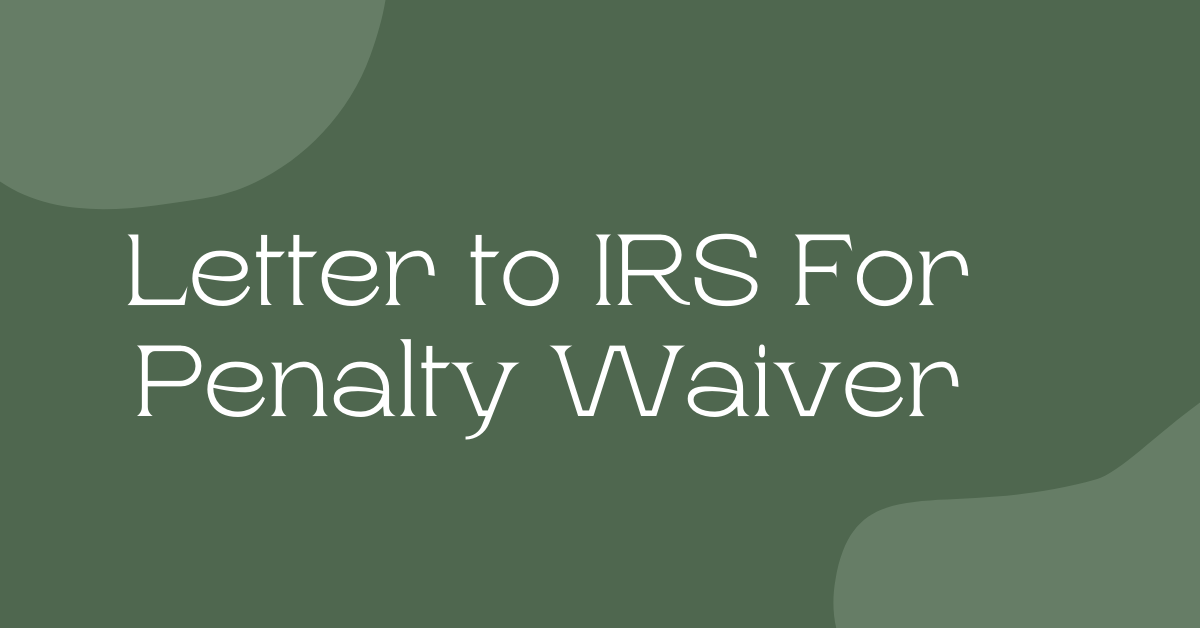Have you ever found yourself in a situation where you owed the IRS a hefty penalty? If so, you know that it can be a stressful and overwhelming experience. The good news is that there are ways to get the IRS to waive your penalties. One way is to write a letter to the IRS requesting a penalty waiver.
In this blog post, I will share some strategies for writing a successful letter to the IRS for a penalty waiver. I will also provide some sample letters that you can use as a starting point. I think that you will find this information helpful if you are facing IRS penalties.
I have been writing for over 10 years, and I have helped many people to get their IRS penalties waived. I know what it takes to write a successful letter to the IRS, and I am confident that I can help you too. In my opinion, the most important thing is to be honest and upfront with the IRS. Explain your situation and why you believe that you should be granted a penalty waiver. The IRS is more likely to be lenient if you are cooperative and respectful.

Sample of a Letter to IRS for Penalty Waiver
[Your Name]
[Your Address]
[City, State, Zip Code]
[Email Address]
[Phone Number]
[Date]
Internal Revenue Service
[IRS Address]
[City, State, Zip Code]
Dear IRS,
I am writing to request a waiver of the penalty imposed on my tax return for the [tax year]. I understand that I am responsible for paying my taxes on time, and I apologize for the late filing.
I have enclosed documentation to support my request. As you can see, I have been experiencing [briefly explain the circumstances that led to the late filing]. These circumstances were beyond my control and made it impossible for me to file my taxes on time.
I have a history of timely tax payments and have always complied with the tax laws. I am committed to fulfilling my tax obligations and would appreciate the opportunity to have the penalty waived.
Thank you for your time and consideration.
Sincerely,
[Your Signature]
[Your Typed Name]
How to Write a Letter to IRS for Penalty Waiver
Writing a letter to the IRS to request a penalty waiver can be a daunting task, but it is important to approach it with a clear and concise approach. Here are some tips on how to write a successful letter:
1. State Your Case Clearly
In the first paragraph of your letter, state your name, address, and Social Security number. Then, briefly explain the reason why you are requesting a penalty waiver. Be specific about the penalty you are referring to and the tax year it applies to.
2. Provide Supporting Documentation
If you have any documentation that supports your request for a penalty waiver, be sure to include it with your letter. This could include proof of financial hardship, a medical emergency, or a natural disaster that prevented you from filing your taxes on time.
3. Be Polite and Respectful
Even though you are writing to request a waiver, it is important to be polite and respectful in your letter. Address the IRS representative by their proper title and use a professional tone throughout your letter.
4. Follow Up
Once you have sent your letter, be sure to follow up with the IRS to check on the status of your request. You can do this by calling the IRS customer service line or by logging into your online IRS account.
5. Be Patient
The IRS may take some time to process your request for a penalty waiver. Be patient and do not be discouraged if you do not receive a response right away. If you have not heard back from the IRS within a few weeks, you can follow up with them again.
Tips and tricks about a Letter to IRS For Penalty Waiver
The Internal Revenue Service (IRS) can impose penalties on taxpayers who fail to file their tax returns on time or who underpay their taxes. However, the IRS may waive these penalties if the taxpayer can show that they had reasonable cause for the failure. Writing a letter to the IRS to request a penalty waiver can be a daunting task, but it is important to do so if you believe that you have a valid reason for the penalty.
Here are seven tips for writing a letter to the IRS to request a penalty waiver:
-
Be clear and concise.
Your letter should be easy to read and understand. Use simple language and avoid jargon.
-
State your case clearly.
In the first paragraph of your letter, state the reason why you are requesting a penalty waiver. Be specific and provide details.
-
Provide supporting documentation.
If you have any documentation that supports your claim, such as a medical excuse or a letter from your employer, include it with your letter.
-
Be polite and respectful.
Even though you are writing to the IRS to request a favor, it is important to be polite and respectful. This will help you build rapport with the IRS employee who is reviewing your letter.
-
Proofread your letter carefully.
Before you mail your letter, proofread it carefully for any errors. Make sure that your grammar and spelling are correct.
-
Keep a copy of your letter.
Once you have mailed your letter, keep a copy for your records. This will help you track the status of your request.
-
Be patient.
It may take several weeks for the IRS to process your request. Do not be discouraged if you do not receive a response right away.
By following these tips, you can increase your chances of getting your penalty waived. However, it is important to remember that the IRS has the final say on whether or not to grant a penalty waiver.
FAQs about a Letter to IRS For Penalty Waiver
What are the most common reasons for requesting a penalty waiver?
The most common reasons for requesting a penalty waiver include reasonable cause, first-time penalty, and financial hardship.
What information should I include in my letter?
Your letter should include your name, address, taxpayer identification number, the tax year(s) for which you are requesting the waiver, the type of penalty you are requesting to be waived, and the reason for your request.
How do I submit my letter?
You can submit your letter by mail, fax, or electronically. The IRS website provides instructions on how to submit your letter.
What happens after I submit my letter?
The IRS will review your letter and make a decision on whether to grant your request. You will receive a written response from the IRS within 30 days.
What if my request is denied?
If your request is denied, you can appeal the decision. The IRS website provides instructions on how to file an appeal.
RELATED:
Market Adjustment Letter to Employee
